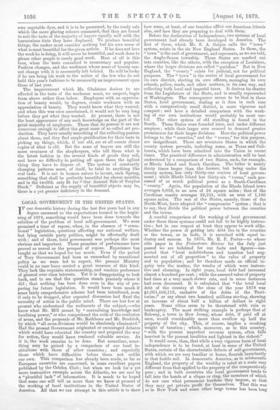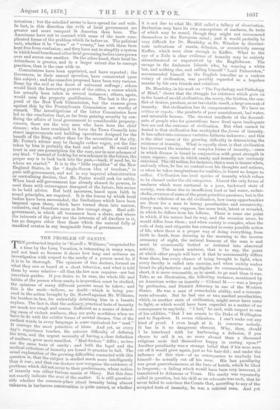LOCAL GOVERNMENT IN THE UNITED STATES.
Ir our domestic history during the last five years had in any degree answered to the expectations formed in the begin- ming of 1874, something would have been done towards the 'solution of the problem of local self-government. We were promised a time of repose, when in the absence of "sensa- tional" legislation, questions electing our national welfare, but lying outside party politics, might be effectually dealt with ; and of these, local government was perhaps the most obvious and important. These promises of performance have proved as unreal as the prospect of repose. Experience has taught us that we hoped for too much. Even if the period of Tory Government had been as unmarked by sensational policy as we were led to expect, the present Ministry could in no case have carried a great measure of this kind. They lack the requisite statesmanship, and resolute preference of general over class interests. Yet it is disappointing to look back, and to see that the question stands precisely where it did ; that nothing has been done even in the way of pre- paring for future legislation. It would have been much if some fairly comprehensive scheme had been introduced, even if only to be dropped, after repeated discussion had fixed the necessity of action in the public mind. There are but few at present who understand the rudiments of the subject,—who know what Mr. Mill meant by "centralising knowledge and localising power," or who comprehend the evils of the confusion of areas, and the proposals of Mr. Rathbone and Mr. Brodrick, by which "all cross-divisions would be absolutely eliminated." Had the present Government originated or encouraged debates which would have educated the country and prepared the way for action, they would have rendered valuable service. As it is, the work remains to be done. But meantime, some- thing may be gained by a comparison of our local in- stitutions with those of other countries ; and especially those which have difficulties before them not unlike our own. This comparibon has already been made, as far as European countries are concerned, in some excellent papers published by the Cobden Club ; but when we look for a yet more instructive example across the Atlantic, we are met by a "plentiful lack" of information. It is much to be hoped that some one will tell us more than we know at present of the working of local institutions in the United States of America. All that we can attempt in this article is to show how some, at least, of our troubles afflict our American friends also, and how they are preparing to deal with them. Before the declaration of Independence, two systems of local government had already been developed in America. The first of these, which Mr. S. A. Galpin calls the " town " system, exists in the six New England States. In these, the "town "is the unit of government, and represents, as we are told, the Anglo-Saxon township. These States are marked out into counties, like the others, with the exception of Louisiana, where the larger divisions are called "parishes." But in New England, the "county" exists for judicial, not for political purposes. The " town" is the centre of local government for its own district, electing its own officers, managing its own schools, police, roads, and other matters, in its own way, and collecting both local and imperial taxes. It derives its charter from the Legislature of the State, and is usually represented at Washington. The consequence seems to be that in these States, local government, dealing as it does in each case with a comparatively small district, is more vigorous and compact ; and here a detailed comparison with the work- ing of our own institutions would probably be most use- ful. The other system of old standing is found in the South. These States were founded later, and under different auspices ; while their larger area seemed to demand greater prominence for their larger divisions. Here the political power belongs to the "counties," and the "towns," for this purpose, are insignificant. There are seventeen States in which the county system prevails, including some, as Texas and Cali- fornia, which have been admitted into the Union in recent times. The practical difference in administration will be best understood by a comparison of two States, such, for example, as Rhode Island and South Carolina. The latter is nearly thirty times larger than the former, but being under the county system, has only thirty-one centres of local govern- ment ; while Rhode Island has thirty-six "towns," each pos- sessed of as much political power as a South-Carolinan "county." Again, the population of the Rhode Island town averages 6,038, to an area of 36 square miles ; that of the Carolinan county averages 22,731, with an area of 1,100 square miles. The rest of the States, namely, those of the North-West, have adopted the " compromise " system ; that is to say, they divide the political power between the counties and the towns.
A careful comparison of the working of local government under these three systems could not fail to be highly instruc- tive; but in one respect at least they appear to work alike. Whether the power of getting into debt lies in the counties or the towns, or in both, it is exercised with equal in- dustry and success. In 1876, Mr. R. P. Porter—to whose able paper in the Princetown Review for the July just passed we are indebted for our facts and figures—sus- pected that "local indebtedness and taxation had aug- mented out of all proportion" to the value of property and to population ; and he therefore made an official in- quiry into the matter, the results of which were instruc- tive and alarming. In eight years, local debt had increased almost a hundred per cent. ; while the assessed value of property had risen at a very much slower rate, and in some instances had even decreased. It is calculated that "the total local debt of the country at the close of the year 1878 was $1,051,106,112, exclusive of the debts of the Terri- tories ;" or say about two hundred millions sterling, showing an increase of about half a billion of dollars in eight years. Some cities seem to be threatened with ruin or bankruptcy. The most striking example is perhaps that of Rahway, a town in New Jersey, whose debt, if paid off at once, would considerably more than swallow up half the property of the city. This, of course, implies a crushing weight of taxation ; which, moreover, as in this country, "with the present imperfect revenue system, often falls heaviest in the poorest localities and lightest in the richest." It would seem, then, that while a very vigorous form of local independence is to be found, at least in some of the United States, certain of the characteristic defects of self-government, with which we are very familiar at home, flourish luxuriantly in that fertile soil. In democratic America, as in aristocratic England, the property of the wealthy is rated at a scale very different from that applied to the property of the comparatively poor ; and in both countries the local government tends to fall into the hands of a clique or ring, the members of which do not care what permanent burdens they impose, so that they may get private profit for themselves. That this was so in New York and some other large towns has been long notorious ; but the mischief seems to have spread far and wide. In fact, in this direction the evils of local government are greater and more rampant in America than here. The Americans have not to contend with some of the more com- plicated forms of the problem which lie before us. The political unit, whether it be " town " or "county," has with them been kept free from confusion ; and they have not to simplify a system in which local boards and other local governing bodies have grown over and across one another. On the other hand, their local in- debtedness is greater, and to a larger extent due to corrupt practices, than is the case with us.
Commissions have been appointed, and have reported ; the Governors, in their annual speeches, have commented upon this subject ; and the remedies proposed have been very various. Some lay the evil at the doors of universal suffrage ; others would limit the borrowing powers of the cities, a course which has actually been taken in several instances ; others, again, would raise the property qualification. The last is the pro- posal of the New York Commission, but the reasons given against this by the Pennsylvania Commission are worthy of remark. The investigations of the latter Commission have led to the conclusion that, so far from gaining security by con- fining the affairs of local government to considerable property- owners, these are the very men who have been the chief sinners ; who have combined to force the Town Councils into street improvements and building operations designed for the benefit of the Ring, rather than for the necessities of the city. Mr. Porter's advice may be thought rather vague, yet the line taken by him is probably the best and safest. He would not trust in any one prescription for the cure, nor in new schemes of any kind. "Instead of looking for new schemes in the future, the proper way is to look back into the past,—back, if need be, to where we started." It is in the "little republics" of the New England States, in the "Anglo-Saxon idea of freedom," in pare self-government, and not in any imperial administration or centralising devices, that Mr. Porter would seek for safety. When local self-government has already abused its powers, or used them with extravagant disregard of the future, this seems to be bold advice. But bold measures, based upon faith in sound principles, are required. It is the fences by which local bodies have been surrounded, the limitations which have been imposed upon them, which have turned them into narrow, exclusive, and therefore more oz less corrupt rings. Real self- government, in which all townsmen have a share, and where the interests of the place are the interests of all dwellers in it, has no dangers other than those which the natural folly of mankind creates in any imaginable form of government.



































 Previous page
Previous page